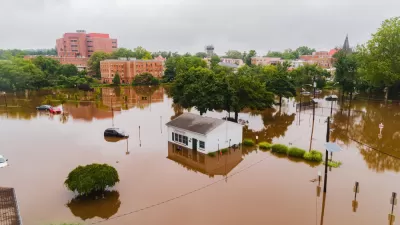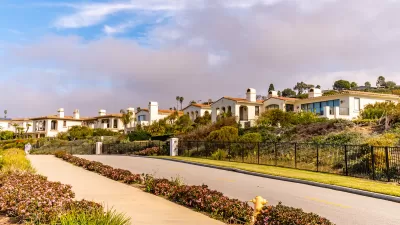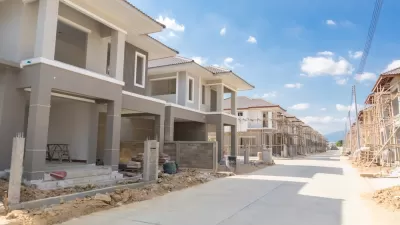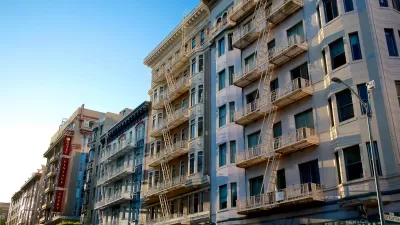Holmdel, New Jersey, moved its affordable housing to flood-prone land, raising a question about planners' ethical obligations to speak up against such moves.

New Jersey’s Holmdel Township settled a seven-year battle over its Fair Housing obligations, and subsequently planned 300 low-income housing units to be placed on wetlands and flood-prone lots. This occurred not in the 1950s but during the pandemic, and less than a decade after Superstorm Sandy brought flooding and devastation statewide. Initially the units were to be sited at Bell Works, a sprawling former corporate campus, seen on Apple TV’s “Severance,” that is now a massive redevelopment project. Instead, the units were moved off campus with the approval of the township council. In January, Holmdel filed with the New Jersey Department of Environmental Protection (NJDEP) for a waiver to redevelop a wetland lot, the new location for some of the low-income housing units.
Transferring the “affordable” income developments to precarious circumstances should have raised red flags. In a state where storms like Sandy are a recurring threat—the remnants of Hurricane Ida last year killed more people in New Jersey than in any other state—it is unlikely Holmdel officials do not understand the risks from floods and storms.
Holmdel’s recent actions perpetuates something called “climate gentrification.” Sheila Lakshmi Steinberg, Ph.D., of University of Massachusetts Global, describes climate gentrification as valuing certain properties over others specifically based on a property’s ability to accommodate settlement and infrastructure in the face of climate change. This deepens racial and socioeconomic divides, as areas of land that cannot withstand these changes are left to the less affluent. Recent death and devastation on Staten Island from storms like Ida and Sandy, and the location of certain housing stock, can be linked to climate gentrification.
How It Began
Holmdel Township is a wealthy suburb of New York City. Its median household income is $149,432. Roughly 77 percent of Holmdel’s 17,000 residents are white, and nearly 90 percent of Holmdel’s housing stock is owner-occupied homes, which have a median value of $661,800.
Plans for low- and moderate-income housing came about through compliance with a 2019 Fair Housing settlement (as the township’s affordable housing obligations have spanned decades of legal challenges). Today, Holmdel’s ordinances have evolved to harness affordable-housing “linkage” ...
FULL STORY: Are Urban Planners Staying Silent on Climate Gentrification?

Planetizen Federal Action Tracker
A weekly monitor of how Trump’s orders and actions are impacting planners and planning in America.

Map: Where Senate Republicans Want to Sell Your Public Lands
For public land advocates, the Senate Republicans’ proposal to sell millions of acres of public land in the West is “the biggest fight of their careers.”

Restaurant Patios Were a Pandemic Win — Why Were They so Hard to Keep?
Social distancing requirements and changes in travel patterns prompted cities to pilot new uses for street and sidewalk space. Then it got complicated.

Platform Pilsner: Vancouver Transit Agency Releases... a Beer?
TransLink will receive a portion of every sale of the four-pack.

Toronto Weighs Cheaper Transit, Parking Hikes for Major Events
Special event rates would take effect during large festivals, sports games and concerts to ‘discourage driving, manage congestion and free up space for transit.”

Berlin to Consider Car-Free Zone Larger Than Manhattan
The area bound by the 22-mile Ringbahn would still allow 12 uses of a private automobile per year per person, and several other exemptions.
Urban Design for Planners 1: Software Tools
This six-course series explores essential urban design concepts using open source software and equips planners with the tools they need to participate fully in the urban design process.
Planning for Universal Design
Learn the tools for implementing Universal Design in planning regulations.
Heyer Gruel & Associates PA
JM Goldson LLC
Custer County Colorado
City of Camden Redevelopment Agency
City of Astoria
Transportation Research & Education Center (TREC) at Portland State University
Camden Redevelopment Agency
City of Claremont
Municipality of Princeton (NJ)





























